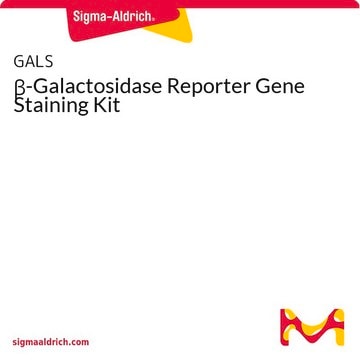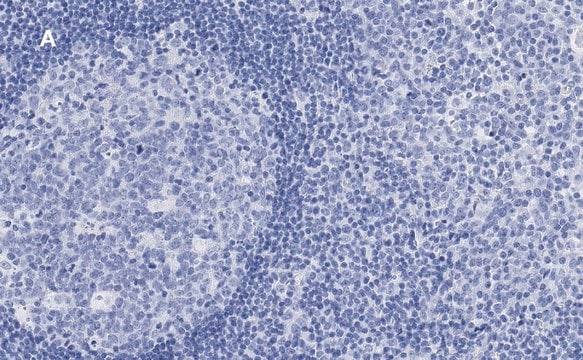추천 제품
사용
sufficient for 250 assays (tubes)
sufficient for 500 assays (microplate)
제조업체/상표
Roche
저장 온도
2-8°C
일반 설명
The β-Gal Reporter Gene Assay is designed for specifically measuring bacterial β-galactosidase activity. To achieve this, the enzyme reaction is conducted at a pH that is optimized for bacterial β-Gal, but allows no significant endogenous eukaryotic β-galactosidase activity. However, if very high endogenous β-galactosidase activity is found (e.g., with hepatic cells), heat treatment can be performed to ensure the specific determination of the amount of bacterial β-galactosidase that is encoded by the transfected plasmid.
애플리케이션
The β-Gal Reporter Gene Assay, chemiluminescent, is used to quantitatively measure β-Gal expression in eukaryotic cells that are transfected with a plasmid bearing the β-Gal-encoding lacZ reporter gene.
특징 및 장점
- Sensitive: Chemiluminescence technology allows detection of approximately 20 fg β-galactosidase in cell extracts
- High dynamic measuring range: Linear range over four to five orders of magnitude
- Constant light emission: The assay produces a long-lasting light emission instead of a short-peak kinetic
- Safe: No radioactive isotopes are used
- Fast: Approximately 1.5 to 2.5 hours elapse from start to finish
- Convenient: Kit contains all reagents needed, including lysis buffer, protease inhibitors, and a positive control
포장
1 kit containing 7 components.
제조 메모
Storage conditions (working solution): Substrate Reagent (solution 1) is stable at least for 24 h at 2 to 8 °C.
Initation Reagent (solution 2) is stable for at least 4 weeks when stored at 2 to 8 °C.
Lysis Reagent, 1x (solution 3) Lysis reagent without protease inhibitors is stable at
-15 to -25 °C or for 3 months at 2 to 8 °C. Lysis reagent containing protease inhibitors is stable for one week when stored frozen at -15 to -25 °C.
Positive Control (solution 4) The reconstituted enzyme solution is stable for 1 week at 2 to 8 °C. When stored frozen in aliquots at -15 to -25 °C the enzyme is stable for 3 months. Avoid multiple freezing and thawing.
Initation Reagent (solution 2) is stable for at least 4 weeks when stored at 2 to 8 °C.
Lysis Reagent, 1x (solution 3) Lysis reagent without protease inhibitors is stable at
-15 to -25 °C or for 3 months at 2 to 8 °C. Lysis reagent containing protease inhibitors is stable for one week when stored frozen at -15 to -25 °C.
Positive Control (solution 4) The reconstituted enzyme solution is stable for 1 week at 2 to 8 °C. When stored frozen in aliquots at -15 to -25 °C the enzyme is stable for 3 months. Avoid multiple freezing and thawing.
기타 정보
For life science research only. Not for use in diagnostic procedures.
키트 구성품 전용
제품 번호
설명
- β-Gal Substrate, Galacton Plus 100x concentrated
- Assay Buffer
- Enhancer
- Initiation Solution
- Protease Inhibitors
- Lysis Buffer 5x concentrated
- Positive Control, β-galactosidase (E. coli), lyophilizate
관련 제품
제품 번호
설명
가격
신호어
Danger
유해 및 위험 성명서
Hazard Classifications
Aquatic Chronic 3 - Eye Dam. 1 - Flam. Liq. 2 - Met. Corr. 1 - Skin Corr. 1B - Skin Sens. 1 - STOT SE 3
표적 기관
Central nervous system
Storage Class Code
3 - Flammable liquids
WGK
WGK 2
시험 성적서(COA)
제품의 로트/배치 번호를 입력하여 시험 성적서(COA)을 검색하십시오. 로트 및 배치 번호는 제품 라벨에 있는 ‘로트’ 또는 ‘배치’라는 용어 뒤에서 찾을 수 있습니다.
Molecular Analysis of the HOXA2-Dependent Degradation of RCHY1
Bridoux L, et al.
PLoS ONE (2015)
Alexandra Tauzin et al.
Journal of virology, 95(15), e0231120-e0231120 (2021-05-14)
Type I interferons (IFNs) are a family of cytokines that represent a first line of defense against virus infections. The 12 different IFN-α subtypes share a receptor on target cells and trigger similar signaling cascades. Several studies have collectively shown
HOXA2 activity regulation by cytoplasmic relocation, protein stabilization
and post-translational modification
and post-translational modification
Deneyer, et al.
Biochimica et Biophysica Acta (BBA)-Proteins and Proteomics (2019)
The O-GlcNAc transferase OGT interacts with and post-translationally modifies the transcription factor HOXA1
Draime et al.
Febs Letters (2018)
Arnaud Taminiau et al.
Nucleic acids research, 44(15), 7331-7349 (2016-07-07)
HOX proteins define a family of key transcription factors regulating animal embryogenesis. HOX genes have also been linked to oncogenesis and HOXA1 has been described to be active in several cancers, including breast cancer. Through a proteome-wide interaction screening, we
자사의 과학자팀은 생명 과학, 재료 과학, 화학 합성, 크로마토그래피, 분석 및 기타 많은 영역을 포함한 모든 과학 분야에 경험이 있습니다..
고객지원팀으로 연락바랍니다.








